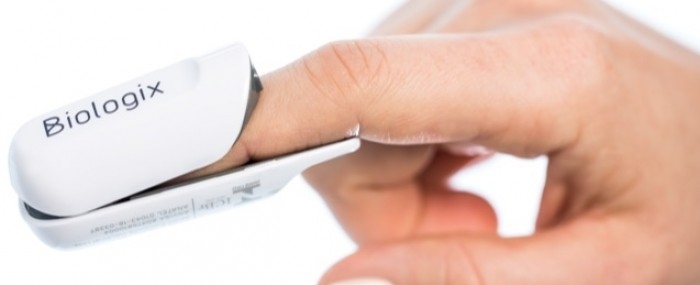


Brazilian healthtech startup Biologix is developing new patient indicators that can also be measured by its wireless finger sensor (photo: Biologix)
Published on 05/12/2021
By Eduardo Geraque | FAPESP Innovative R&D – Having suffered from sleep apnea for three decades and submitted to several polysomnograms (sleep studies), Tácito Mistrorigo de Almeida, a Brazilian electronic engineer, decided to take an innovative idea from drawing board to marketplace. After four years of development, the startup he founded received funding from FAPESP to launch a novel service that monitors starts and stops in breathing during sleep.
“We’ve already sold 200 subscriptions to the service,” Almeida says. In fact, Biologix, as the healthtech startup is called, was founded by Almeida with Geraldo Lorenzi Filho, a pulmonologist who specializes in sleep medicine. It is now ready to mass market its innovation.
Lorenzi heads the Sleep Laboratory at the Heart Institute (INCOR) of Hospital das Clínicas, the general hospital run by the University of São Paulo’s Medical School (HC-FMUSP). It is the largest hospital complex in Latin America.
According to Almeida, the service has won all necessary certifications in Brazil, having been approved by the National Health Surveillance Agency, the telecommunications regulator (ANATEL), and the National Institute of Metrology, Quality and Technology (INMETRO).
The service, Almeida adds, is a robust alternative to polysomnography but not a perfect substitute, as the standard procedure is more suitable in some cases.
The software component is an algorithm that runs on a smartphone app also developed by the research group. The app records patient data while the patient is asleep at night and sends it to a cloud-based platform. The system is able to detect whether the patient is really asleep when oxygen levels are measured.
The hardware component is Oxistar, a wireless sensor attached to the patient’s finger. It collects data at home, dispensing with the need for hospitalization. The presence of sleep apnea is diagnosed on the basis of blood oxygen levels, so a pulse oximeter is the main measuring instrument.
The sensor detects the number and frequency of drops in oxygenation per hour and the number of times the upper airways are blocked during sleep, Almeida explains.
According to the medical literature, a 3% drop in blood oxygenation is enough to diagnose sleep apnea. In the most severe cases, oxygenation desaturation may exceed 10%.
“In the United States, the data show that 85% of people with sleep apnea are unaware of the problem. It’s a treatable disease as long as it’s correctly diagnosed,” Almeida says. Sleep apnea can be associated with heart disease and stroke.
Development of the product has been supported by the PIPE/PAPPE Grant Program, which combines funding from FAPESP’s Innovative Research in Small Business Program (PIPE) and FINEP, the Brazilian government’s innovation agency.
Selling the service
“We’ve reduced the cost significantly,” Almeida says. A conventional polysomnogram costs about 2,500 Brazilian Reals (now about USD 670). A subscription to the service offered by Biologix costs only 20% of that amount.
“We focus on selling a subscription to the service, which covers the sensor, the smartphone app, data recording, and the production of medical reports,” Almeida says. “Some subscribers have more than one sensor. We have customers in several regions of Brazil. Most are doctors and laboratories.”
Biologix’s team is now working on the development of new indicators that can also be measured using a finger sensor. “The latest novelty is sound: our system is also recording patient snores,” Almeida says.
Company: Biologix
Site: www.biologix.com.br
Contact: sac@biologix.com.br
Source: https://agencia.fapesp.br/31032